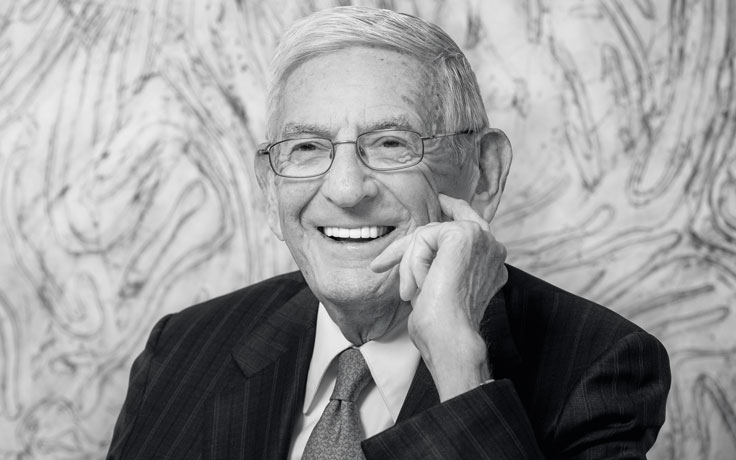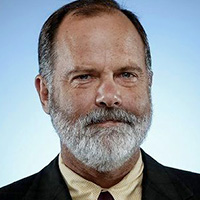LOS ANGELES IN THE LATE 19TH CENTURY had its centralizing figure: newspaper publisher General Harrison Gray Otis set the city’s business and political climate, tilting it against organized labor and devoting it to development and growth. Under his leadership, Los Angeles grew to rival and ultimately transcend San Francisco as California’s most important metropolis.
Los Angeles in the late 20th (and early 21st) century has his counterpart. Eli Broad has wielded more influence in more ways over more time than anyone else in the modern life of this city. Broad retired recently from day-to-day operations at the Eli and Edythe Broad Foundation, but he remains a trustee and sits on the board of the Los Angeles art museum that bears his name. He has helped elect mayors, advanced an agenda for school reform, elevated arts and culture, funded medical research, revitalized the city’s skyline and served as its principal benefactor. Today’s Los Angeles is not only a major American city, but also an international beacon of culture and a sphere of progressive politics. It owes those distinctions to Broad more than to any other person.
Broad is not alone, any more than Otis was. In Broad’s case, he’s surrounded by a culture of philanthropy and influence. Among others, David Geffen, Lynda and Stewart Resnick, Ron Burkle, Steven Spielberg, Wallis Annenberg and Meyer and Renee Luskin (whose names adorn the school where this magazine is headquartered), all have made enormous contributions to this city in fields from education to politics. They sometimes clash, but all have contributed to this region’s larger culture. Others, including the recently deceased Marion Anderson, quietly funded programs in the arts and education, and Jerry Perenchio, who also died recently, amassed profound but quiet significance, giving anonymously and otherwise enriching Los Angeles without courting attention.
What sets Broad apart is not so much his generosity as his influence. Broad gives generously but also strategically — he uses his money to support projects he admires and then requires that those efforts produce results. He does so openly, even brazenly. In fact, Broad can be difficult. He was fired from his first job. He’s impatient and curt. He doesn’t like small talk or long meetings. He doesn’t play golf because it takes too long. The first line of his memoir reads: “I am unreasonable.” The book’s title is “The Art of Being Unreasonable.”
Controversial — and effective
This has given incitement to his adversaries, of whom there are many. Teachers’ unions complain that he has used his money and influence to denigrate their work and advance charter schools at the expense of traditional public schools. Arts patrons say he has bullied them.
Political opponents wince at his dismissals. During a recent conversation, we talked about the governor’s race. He paired his enthusiasm for former L.A. Mayor Antonio Villaraigosa with a brusque shrug at Villaraigosa’s rival, Lt. Gov. Gavin Newsom. “I can’t get excited that there’s great substance there.”
And yet, Broad projects clarity. He is blunt, straightforward — not a dodgy businessman trying to hide his cards. “He doesn’t do foreplay,” then-Mayor Richard Riordan, a close friend of Broad, once told me, chuckling about his steadfast ally.
Broad built not one but two fortunes off relatively simple ideas, pursued with relentless intensity. He founded Kaufman and Broad, a homebuilding empire, on the premise that baby boomers would need inexpensive, well-built houses as they grew into adulthood. He built them without basements, saving money, and his business exploded across the American Southwest. Then he built SunAmerica, an offshoot of homebuilding that provided insurance and retirement planning to those same boomers.
Both companies were staggering successes: SunAmerica was, in fact, the best invesment on the New York Stock Exchange during most of the boom years of the 1990s. The wise or lucky person who bought $10,000 of Kaufman and Broad stock when it went public in 1961 — and held it through the SunAmerica spinoff — would have had $34.1 million when SunAmerica merged with AIG in 1998. Suffice it to say that Broad owned more than $10,000 worth of the initial stock.
Without Broad and Andrea Van de Kamp, another of Los Angeles’ commanding figures, there would be no Disney Hall, one of L.A.’s greatest buildings. Without Broad, Riordan might not have become mayor — and the city’s political, economic and cultural renaissance under Riordan’s watch might have been missed, or at least delayed. Without Broad, Los Angeles might not have hosted the Democratic National Convention in 2000. Even with Broad, Villaraigosa might not be California’s next governor — but if he wins, it will be with Broad’s help.
All of which makes Broad an expert about the intersection of philanthropy and public policy. He is a generous giver with decided views of how society should work. He gives to those whose projects or social policies he finds to his liking. By doing that, he uses his generosity to advance some public policies at the expense of others. Is this appropriate? Should Broad, because he is a wise investor and shrewd businessman, have an outsized say in how Los Angeles children are educated? Or what art Angelenos have access to? Or which cancer treatments receive the most lavish funding?
Crisp, efficient Broad
Broad is a model of restrained influence. His hair is closely cropped. Rarely have I seen him without a sharp jacket and a pocket square. He listens to questions politely and answers them carefully. He likes to gossip and laughs easily, but not at the expense of business. He does not dawdle, delay or mince words. Faced with a decision, he makes it and moves on. His staff reflects his temperament: Smart, focused and crisp, his employees share a suite of offices in Century City and work there with the quiet intensity that is Broad’s signature.
Broad was born in the Bronx and raised in Detroit. He collected stamps as a boy and studied accounting as a young man. After graduating from Michigan State, he aced his licensing examinations and became the youngest CPA in the history of Michigan.
In 1954, he married Edye Lawson, a gracious and personable young woman introduced to Broad by a friend. At his pleading, she sold the dinner plates they received as a wedding present to finance their first land acquisition — becoming, as he jokes in his memoir, the rare bride willing to trade dishes for dirt. A $12,500 loan from her father launched Broad into his first business. Near the end of the 1950s, he and his partner, Don Kaufman, sold their first group of homes, 15 houses with a combined value of more than $200,000.
Homebuilding pulled Broad out of the Midwest, first to Arizona and then to California. He and his wife arrived in Los Angeles in 1963. Over the ensuing 54 years, he dabbled in politics, developed a taste for collecting art — Edye bought their first piece — and became wealthy. Estimates vary, but Eli Broad is certainly worth more than $5 billion, ranking him among the richest men in America. His memoir includes a forward by Michael Bloomberg and promotional blurbs from Bill Gates and Bill Clinton. It was, of course, a best-seller.
Though Broad is not naturally outgoing, he understands publicity and the press. He puts his name on his buildings, and he is dogged about championing his causes. I’ve been writing about him for more than 25 years. To my knowledge, he has never lied to me or even shaded the truth, although he has, more than once, refused to answer a question.
We talked not long ago in his office — modern, white and spare, with a grand view of the city he has done so much to create. He and his foundations are in Fox Tower at Century City; they are scrupulously decorated with art from his vast collection, the highlights of which are displayed at The Broad museum, which he built, across from Disney Hall, which he helped raise money to build. Beneath his office windows are thousands of homes, many produced by Kaufman and Broad. Downtown, where signature buildings and the central park all have a connection to Broad, lies grandly at the horizon.
On this summer morning, he began by summing up the state of culture in Los Angeles. The city today, Broad reflected, is far different from the city he came to more than 50 years ago. Today’s Los Angeles boasts the nation’s finest philharmonic, he said, and a collection of art museums that are among the world’s best. Its hospitals and medical research facilities — notably, those at UCLA and USC — are thriving, and tuition is free at community colleges. Philanthropy has made all those things possible.
“Culturally, we’ve gotten a great reputation, with a lot of cultural tourism,” Broad said. “The reputation of the city has changed from just being Hollywood to a lot more than that. … Fifty years ago, all anyone thought about Los Angeles was Disneyland, Hollywood and the beaches. I think the reputation of the city is changed dramatically.”
Los Angeles not only looks different because of Broad, but it also feels different. A few decades ago, downtown emptied out when the sun went down. But then culture helped draw entertainment, which encouraged housing. Today, some of the city’s hippest new restaurants are downtown, serving patrons who live in the area’s booming apartment and condominium developments. During the early morning and evening, the streets of downtown teem with residents walking their dogs. What began as philanthropy has become a self-sustaining, dynamic community.
All of which pleases Broad immensely.
But what about those who don’t share his taste in architecture — or believe, as he does, that charter schools are enriching and expanding educational opportunities for young people in Los Angeles?
Broad seemed puzzled by the question. “I have yet to hear many people complain about contemporary architecture downtown, whether it’s our museum, Walt Disney Concert Hall, the cathedral, etc.,” he said, smiling bemusedly. “It’s the art of our times. I mean, if people want to have a colonial home or something, that’s fine.”
As for charter schools, Broad made no apology for his advocacy. To the contrary, he argued that the schools are improving lives. “We’ve got great charter schools in this city,” he said. “And they’ve raised the standard for all of the other schools. … I feel great about that.”
Life after Broad
In part, philanthropy is powerful precisely because it isn’t government. Unconstrained by the rules that guide government action, charity can focus on the problems that its patrons identify, and it can shape policy by funding solutions in those areas. Broad is under no obligation to subsidize colonial architecture, or Catholic schools, or animal welfare; he is moved, instead, by medical research, the arts and improving public education. Those who object to Broad’s taste or his politics can opt not to take his money. But there is no denying his extraordinary and far-flung influence. Indeed, one question that Los Angeles someday must face is: What to do without Broad when he’s gone?
Perhaps that’s good. One danger for a city so dominated by a single philanthropist is that it is easy to assume that Broad will pick up the tab for this project or that one. It is easy to step away, knowing that Broad is likely to step forward.
Still, as his announcement of his retirement last month makes clear, he won’t always be here. Who will be the General Otis, the Eli Broad of the coming generation?
“I think it will happen,” Broad said, eyes squinting. He smiles a bit at the thought. “I can’t predict when or who.”























